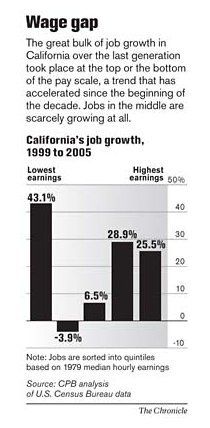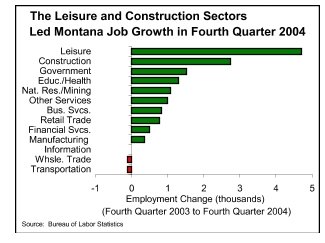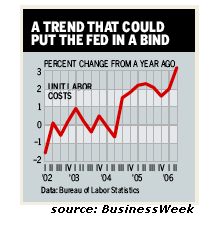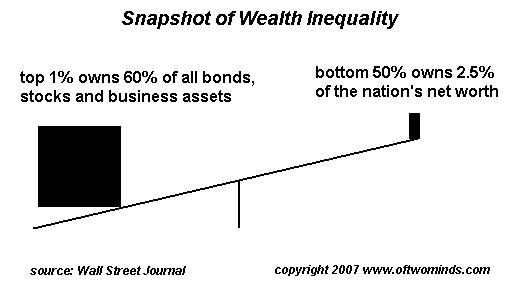

|
| weblog/wEssays archives | home | |
|
20 Years of Schooling and They Put Me on the Day Shift--at Starbucks (August 24, 2007) Frequent contributor Harun I. offered these comments on the lay-offs which are decimating the financial services sectors: (Financial job cuts soar on housing woes) The next shoe to drop will be jobs. You have wisely touched on this before. People look at jobs losses and think in linear terms but what is understated is the multiplier effect. One person losing a job affects everyone in his/her supply/service chain causing a feedback loop. The effects of losing 3 million well paying manufacturing jobs was forestalled by cheap labor (illegal immigrant and offshore), cheap goods, credit cards and housing price inflation (Housing ATM).(What is Hell Week? here are two descriptions of this elite-unit/Navy SEAL training: Navy SEALs’ first task: Survive ‘Hell Week’ and SEAL Training Hell Week) Stories like this one from the San Francisco Chronicle are appearing with disturbing regularity:  Surprise: The rich get richer and the poor get more numerous
(see accompanying chart on right).
Surprise: The rich get richer and the poor get more numerous
(see accompanying chart on right).
Here's what's not coming through the official statistics: 1. high-paying jobs for non-young/non-techies are vanishing and not being replaced 2. Americans are ill-prepared for "belt-tightening" due to high debt payments 3. Even as wages have stagnated/remained flat since 2000, employers' costs continue rising 4. Purchasing power has dropped far below what it was a generation or two ago. This last point is important. The $1.60 minimum wage I earned in 1969 is worth $9.08 in today's dollars, according to the official Bureau of Labor Statistics Inflation Calculator. (Scroll down to Get Detailed CPI Statistics) Yet a young acquaintance of ours who worked at Starbucks (fortunately he just got a job which pays more and has regular hours) reports that he was paid $7.65 per hour before receiving a raise to $8.25--which is 10% less than I earned at minimum wage in 1969. He also reported the average shift at the local Starbucks is 4.7 hours. Why the weird length? Because at 5 hours, the employer has to provide a lunch break. So if you ever wondered how Starbucks generates their huge profit margins, wonder no more. Did I mention that the average rent for a small apartment in this area is $1,000 and up? In 1974 I was still able to rent a studio apartment for $125 per month--in Honolulu, long one of the nation's priciest cities to live in. According to the BLS, that works out to $528 in today's dollars. Good luck on finding a studio apartment in Honolulu today for $528/month. If you double that number, you're getting close. I can go on and on with accounts like this. Another friend was a newly minted engineer in San Jose in the late 60s, earning $10,000 a year, ($60,000 in 2007 dollars) and he rented a nice new apartment for $150/month--$800 today. That apartment would cost 50% more to rent in today's money. Another buddy supported an entire household of hippies in Pittsburg in that era with his job at U.S. Steel. Try supporting even a few kids on one job nowadays.  Let's take a look at the jobs which were created in this "global economy has never been
stronger" era (Treasury Secretary Paulson's snappy line): leisure, construction and government
jobs.
Let's take a look at the jobs which were created in this "global economy has never been
stronger" era (Treasury Secretary Paulson's snappy line): leisure, construction and government
jobs.
Leisure: tourism, dining out, all those generally low-paying service jobs. What do you think happens to dining out and tourism in a recession? As discretionary consumer spending, they are first on the list of what gets axed from family spending. Construction: good-paying jobs, but we know what's happened to construction employment--and it's not coming back for a long, long time. You were making $25/hour as a carpenter? Here's your new job, pal--$8/hour at Starbucks. Oh, and your shift is only 4.7 hours long. Government: Although government employees tend to forget this inconvenient truth, all that tax revenue is skimmed off productive businesses and wage earners. As the housing bust and the looming recession strangles profits, sales and wages, guess what happens to tax revenues?  Barry Ritholtz, proprietor of the
The Big Picture blog, wrote an
excellent entry on August 21, 2007 documenting the fact that real wages have actually declined
in the past 6 years.
Barry Ritholtz, proprietor of the
The Big Picture blog, wrote an
excellent entry on August 21, 2007 documenting the fact that real wages have actually declined
in the past 6 years.
But as the chart on the right reveals, employers' labor costs are rising. The reason labor costs can rise while wages decline is easy: overhead costs are rising--the costs of employment other than wages: health insurance, workers' compensation insurance, taxes, etc. Bottom-line: employers are getting squeezed, meaning there are good reasons to hire as few employees as possible. Let's also consider all those financial services jobs which are vanishing. One story in the media after another has chronicled young high-school graduates who entered the mortgage loan trade as salespeople, earning $100,000+ a year from writing mortgages for their friends and speculators.  You were earning $10,000 a month writing subprime loans? We got your new
job right here, buddy--$7.65/hour at Starbucks, Oh, and we only need you for 4.7 hours,
and tomorrow you open at 5:30 a.m. and the next day you close at 11 p.m.
You were earning $10,000 a month writing subprime loans? We got your new
job right here, buddy--$7.65/hour at Starbucks, Oh, and we only need you for 4.7 hours,
and tomorrow you open at 5:30 a.m. and the next day you close at 11 p.m.
Let's review job-market reality: High-paying financial-services jobs? Gone for good. Ditto big-bucks construction jobs. Real-estate speculation profits? History. Fat government payrolls? Good for now, but check back in 2008 when tax revenues fall off a cliff. But what about all those great Web 2.0 tech jobs? Sure--if your start-up gets funding, if you're under 30 (old folks cost too much in overhead) and as long as you're prepared to get laid off next year as Web 2.0 does a dot-com Redux melt-down . . . The sad truth is most working Americans have sustained their lifestyle in an economy of flat wages and declining purchasing power by borrowing vast sums which they now must pay off. (See chart above.) To add insult to injury, even losing your home isn't the end of your pain--it's just the beginning, as all that forgiven debt is viewed as income by the I.R.S.: (thanks to frequent contributor U. Doran for this story from the New York Times): After Foreclosure, a Big Tax Bill From the I.R.S. Aren't those financial services folks who provided these homeowners with a loan at 14% really wonderful? And how about our government, happy to collect taxes on your catastrophic losses? Really serving the citizenry, aren't they? Just for a refresher, here are the facts on who holds the wealth of this nation. It's sad, isn't it, how Joe and Jane Citizen tried to keep up with the Jones's, Sanchez's and Wongs by borrowing to the hilt and speculating with housing, all in a desperate bid to have the lifestlye they saw paraded around on TV. It's not the 1% who are about to experience Hell Year/Hell Decade, it's the rest of us with no savings, no assets, declining income and purchasing power, and soon, fewer jobs. 
Thank you, Robert P., ($11) for your generous and much-appreciated donation to this humble site. I am greatly honored by your support and readership. All contributors are listed below in acknowledgement of my gratitude. For more on this subject and a wide array of other topics, please visit my weblog. copyright © 2007 Charles Hugh Smith. All rights reserved in all media. I would be honored if you linked this wEssay to your site, or printed a copy for your own use. |
||
| weblog/wEssays | home |